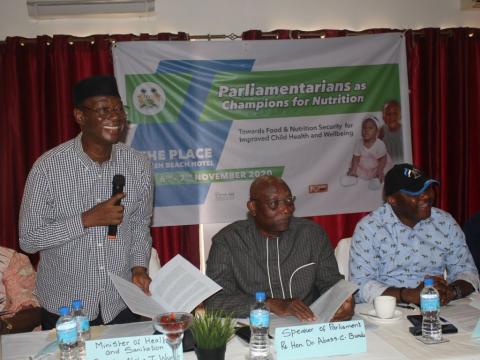By Kemo Cham
The Sierra Leone parliament is ready to adopt and legislate the code on breast milk substitute, which is currently under drafting, the Speaker of Parliament, Dr Abass Bundu, has assured.
Dr Bundu told officials seeking for the enactment of the law which seeks to regulate the marking of breast milk substitutes that as lawmakers they were committed to the country’s development, which he noted was tied to the health and wellbeing of its people.
He was speaking on Saturday, November 7, at the end of a three-day National Consultative Conference with MPs and stakeholders on nutrition.
Some 30 MPs attended the conference, which was co-hosted by the health NGO FOCUS 1000 and the Directorate of Food and Nutrition in the Ministry of Health and Sanitation. Among the participants were the Clerk of Parliament, Paran Umar Tarawallie and the majority and minority leaders in the House.
The event, held on the theme: “Parliamentarians as champions of nutrition,” is part of ongoing campaign against malnutrition, which data indicate is a major health problem for Sierra Leone.
Promotion of breastfeeding is a key aspect of the campaign against malnutrition, which is considered a major fueling factor of the country’s twin health crises - maternal and infant mortality.
While official data show that there have been improvement in breastfeeding generally, but the rate of exclusive breastfeeding remains low. This, experts say, has a huge health implication on infants.
Proliferation of breast milk substitutes have been partly blamed for this. The code is meant to not just ensure that products brought into the country meet international standards of safety, but it also seeks to regulate advertising with the goal of encouraging women to breastfeed their babies, rather than relying on breast milk substitute.
Under the Scaling Up Nutrition (SUN) platform, campaigners have been working towards the legislation of the code, a draft document for which has since been done, and was with the Law Officers Department, having passed through Cabinet, ahead of its imminent presentation to parliament for approval.
Saturday’s engagement with the lawmakers was part of efforts to sell the idea to them prior to its presentation.
MPs, in various presentations, were introduced to the content of the document and the overall goal of fighting malnutrition.
The House Speaker told the conference that while in the past breastfeeding had been a pride for mothers who “openly engaged in breastfeeding,” the situation had changed due to “an intrusion” into the country’s values, which they as lawmakers recognized the need to collaborate in addressing it.
“The purpose of our coming here is to reaffirm that value. We stand ready as parliament to adopt and pass the law,” he said.
Aminata Shamit Koroma, Director of Nutrition in the Ministry of Health and Sanitation, in a presentation spoke about the state of nutrition in the country and its correlation to food insecurity. Some 63 percent of Sierra Leoneans, she noted, are food insecure. And 30 percent of children are stunted, she added.
Ms Koroma said the conference was a forum meant to take the discussion to the next level, citing the need for allocation of adequate resources.
“The wellbeing of our children should be a health issue, so this dialogue hinges on the health and wellbeing of our children,” she said.
The SUNI is a global campaign that brings together government and private sector players, including civil society, gearing towards advocating for resources and enabling environment to help stop malnutrition and prevent its numerous health consequences.
In Sierra Leone the SUN Movement is headed by the government. And FOCUS 1000 heads its civil society wing.
Mohamed Bailor Jalloh, Chief Executive Office of FOCUS 1000, likened the importance of having a strong foundation for a building to taking care of children during the first 1000 days of their life. Exclusive breastfeeding, he said, is an important part of that.
Jalloh singled out the Minister of Health, Professor Alpha Tejam Wurie, for his role in passing the draft code through cabinet, to the Justice Ministry for drafting into a piece of legislation.
“This has been a long battle since 2012, it’s him (Wurie) who has been able to get it to cabinet and now it’s going to parliament,” Jalloh told the conference.
The event was graced by representatives of Sierra Leone’s development partners, including the World Health Organization (WHO) and the UN children’s agency, Unicef.
Dr Steven Velabo Shongwe, Country Representative of WHO, said the event is “an important milestone” for the health of children in the country. He noted that attendance of the MPs pointed to their commitment and dedication to service, urging them to push on with such commitment until the goal is achieved.
“The first three years of life is key to the growth of children,” said Dr Shongwe, adding that appropriate feeding for children is crucial for their development and provides them with the best start in life.
Sierra Leone is said to be one of five countries in West Africa which doesn’t have any legal measure on the regulation of breast milk substitute, which leaves it short in fulfilling a global treaty of immense importance. The other countries without a similar code are Guinea, Liberia, Mauritania and Togo.
Copyright © 2020 Politico Online








